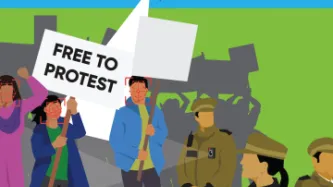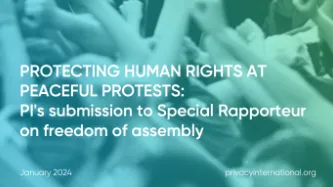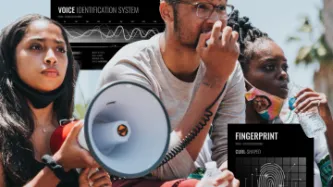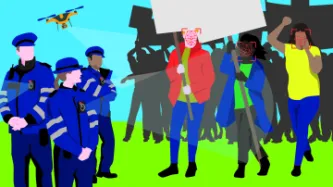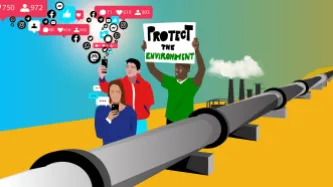Search
Content type: Examples
Teachers and staff members at state primary and upper primary schools across the Indian state of Uttar Pradesh are protesting the requirement that they use a digital attendance system to log their entry and exit times. Among the problems: the system was introduced without a trial period to solve problems and the portal allows only 15 minutes for taking attendance. They are refusing to use the system until other needs, such as earned leave and compensatory holidays when they have to work on…
Content type: Long Read
The fourth edition of PI’s Guide to International Law and Surveillance provides the most hard-hitting past and recent results on international human rights law that reinforce the core human rights principles and standards on surveillance. We hope that it will continue helping researchers, activists, journalists, policymakers, and anyone else working on these issues.The new edition includes, among others, entries on (extra)territorial jurisdiction in surveillance, surveillance of public…
Content type: Report
First published in 2017, PI’s Guide to International Law and Surveillance is an attempt to collate relevant excerpts from these judgments and reports into a single principled guide that will be regularly updated. This is the fourth edition of the Guide. It has been updated it to reflect the most relevant legal developments until March 2024.The Guide aspires to be a handy reference tool for anyone engaging in campaigning, advocacy, and scholarly research, on these issues. The fourth…
Content type: Report
The methodology employed for this report consists primarily of in-depth interviews held with grassroots political workers and representatives of collectives. The researchers interviewed 14 individuals from various social justice causes such as womens’ rights, climate change, transgender rights, students’ rights and the right to universal internet access in Pakistan. The experiences they have shared with the interviewers along with the real-time developments in the country’s law and order…
Content type: Advocacy
Privacy International had suggested the Human Rights Committee consider the following recommendations for the UK government:Review and reform the IPA 2016 to ensure its compliance with Article 17 of the ICCPR, including by removing the powers of bulk surveillance;Abandon efforts to undermine the limited safeguards of the IPA 2016 through the proposed Investigatory Powers Amendment Bill;Refrain from taking any measures that undermine or limit the availability of encrypted communications or other…
Content type: Advocacy
Privacy International (PI), Big Brother Watch (BBW), StopWatch, CopWatch, Defend Digital Me, Liberty and Statewatch have written to Home Secretary James Cleverly to raise concerns over the danger posed to UK society by Facial Recognition Technology (FRT).In a letter sent on 18 January 2024, the signatories raised concerns over the escalating use of FRT and warned the Home Secretary that "The indiscriminate use of this dystopian biometric technology to identify people in public spaces is a form…
Content type: Advocacy
Privacy International's response to the call of submissions of the UN Special Rapporteur on the rights to freedom of peaceful assembly and of association on the tools and guidelines which may assist law enforcement in promoting and protecting human rights in the context of peaceful protests. The Special Rapporteur's report will be presented at the 55th session of the UN Human Rights Council.While PI recognises the role of law enforcement can play in facilitating the enjoyment of freedom of…
Content type: Explainer
The Free to Protest Guide Pakistan has been created by adapting Privacy International's (PI) Free to Protest Guide UK according to the laws and policies of Pakistan, in collaboration with PI and local activists in Pakistan.The Guide has been published in English, Urdu, Punjabi and Pashto.DISCLAIMER: This guide forms part of PI's global work to highlight the range of surveillance tools that law enforcement can use in the protest context, and how data protection laws can help guarantee…
Content type: Long Read
TAKE ACTION TO STOP THE END OF PRIVACY IN PUBLIC1. IntroductionThe use of facial recognition technology (FRT) by law enforcement and private companies in public spaces throughout the UK is on the rise. In August 2023, the government announced that it is looking to expand its use of FRT, which it considers “an increasingly important capability for law enforcement and the Home Office”. The indiscriminate use of this dystopian biometric technology to identify individuals in public spaces is a form…
Content type: Advocacy
Dejusticia, Fundación Karisma, and Privacy International submitted a joint stakeholder report on Colombia to the 44th session of the Universal Periodic Review at the UN Human Rights Council.Our submission raised concerns regarding the protection of the rights to freedom of expression and opinion, to privacy, and to personal data protection; the shutdown of civil society spaces; protection of the right to protest; and protection of the rights of the Venezuelan migrant and refugee population.…
Content type: Advocacy
On 6th October 2023, we submitted our comments on the Regulation of Interception of Communications and Provision of Communication-related Information Amendment Bill (the Rica Bill), published in Government Gazette 49189, August 25th, 2023, in response to a call for comments issued by the Portfolio Committee on Justice and Correctional Services – a committee of the Parliament of South Africa responsible for overseeing responsible the Department of Justice and Constitutional Development.
In our…
Content type: Report
PI has been fighting against police using intrusive & disproportionate surveillance technologies at protests around the world for years. Unregulated surveillance and indiscriminate intrusions on our privacy have a chilling effect on the right to freedom of assembly.
We've fought to uncover the types of technologies that police secretly deploy at protests, and we have detailed how protesters around the world can try to protect their intimate and sensitive data from being captured by the…
Content type: News & Analysis
We have been fighting for transparency and stronger regulation of the use of IMSI catchers by law enforcement in the UK since 2016. The UK police forces have been very secretive about the use of IMSI catchers – maintaining a strict “neither confirm nor deny” (NCND) policy. In our efforts to seek greater clarity we wrote to the UK body which monitors the use of covert investigatory powers, the Investigatory Powers Commissioner’s Office (IPCO), asking the Commissioner to revisit this…
Content type: Long Read
The defense and protection of the environment continues to come at a high cost for activists and human rights defenders. In 2021, the murders of environment and land defenders hit a record high. This year, a report by Global Witness found that more than 1,700 environmental activists have been murdered in the past decade.
While the issue of surveillance of human rights defenders has received attention, evidence of the surveillance of environmental activists keeps mounting, with recent examples…
Content type: Report
End-to-end encryption (E2EE) contributes significantly to security and privacy. For that reason, PI has long been in favour of the deployment of robust E2EE.Encryption is a way of securing digital communications using mathematical algorithms that protect the content of a communication while in transmission or storage. It has become essential to our modern digital communications, from personal emails to bank transactions. End-to-end encryption is a form of encryption that is even more private.…
Content type: Examples
The Burkina Faso government cut off internet access across the country following protests demanding the resignation of president Roch Marc Christian Kabore. Insurgents have attacked military positions as well as gold-mining operations. A government statement said the outage was extended under a legal provision relating to national defence and public security.
https://www.bloomberg.com/news/articles/2021-11-25/burkina-faso-extends-internet-shutdown-before-nov-27-protests?sref=Hjm5biAW Internet…
Content type: Examples
On January 5, 2022 the Kazakhstan government shut down the internet nationwide in response to widespread civil unrest after the government's removal of a price cap led liquid natural gas prices to rise sharply. Government use of a kill switch to block internet access is rising as a way of suppressing dissent and exercising social control; other examples include Iran, Sudan, Egypt, China, and Uganda. Kazakh law permits the government to temporarily suspend communications networks; much of the…
Content type: Examples
On December 25, 2021, Sudanese security forces shot and killed four pro-democracy protesters and wounded hundreds of others who, among tens of thousands of people, defied a security lockdown and telecommunications network shutdowns to demonstrate against military rule, AFP News reports. Security forces installed new CCTV cameras on major thoroughfares in advance of the protests, which demanded a transition to a civilian government. Activists have also condemned sexual attacks on women and girls…
Content type: Examples
Following a complaint from the Association for Civil Rights in Israel, the country's attorney general has said the Shin Bet security agency's use of mobile phone tracking technology to monitor and threaten Palestinian protesters at Jerusalem's Al Aqsa Mosque in May 2021 was a legitimate security tool, Josef Federman reports at ABC News. Shin Bet sent a text message to both Palestinian residents of east Jerusalem and Palestinian citizens of Israel who were determined to be in the area of the…
Content type: Examples
Just as China uses technology system called "Integrated Joint Operations Platform" to control and surveil the persecuted population of Uighurs while restricting their movement and branding dissent as "terrorism", the Israeli military is using facial recognition and a massive database of personal information to control millions of Palestinians in the occupied West Bank. In November 2021, NSO Group's Pegasus spyware was found on the phones of six Palestinian human rights activists, three of whom…
Content type: Examples
The Israeli minister of public security has joined police in denying claims in an article in Calcalist that the country's police force have used NSO Group's Pegasus software to spy on the phones of people who led protests against former premier Benjamin Netanyahu. Calcalist reported that the surveillance was carried out without court supervision or oversight of how the data was used. The daily Haaretz newspaper also reported that it had seen a 2013 invoice in which NSO billed police @@2.7…
Content type: Examples
Ukraine and Russia are both weaponising facial recognition - but Russia is using it to hunt down anti-war protesters, holding and sometimes torturing anyone who refuses to be photographed, while Ukraine is using software donated by Clearview AI to help find Russian infiltrators at checkpoints, identify the dead and reunite families. Russia's widespread surveillance means that activists can be followed and arrested anywhere. In an approved, peaceful anti-government rally in Moscow in 2019,…
Content type: Examples
Footage captured by Bloomberg shows that police are arresting anti-war protesters in Russia and scrolling through their phones.
https://www.bloomberg.com/news/videos/2022-03-07/russian-police-search-protesters-phones-make-arrests-video
Writer: Kommersant
Publication: Bloomberg TV
Publication date: 2022-03-07
Content type: Examples
Based on a draft methodology from Russia's Emergency Situations Ministry, Kommersant business daily reports that Rostec's data subsidiary, Natsionalny Tsentr Informatizatsii, is developing software that will use machine learning to detect and prevent mass unrest. The software will analyse news reports, social media postings, public transport data, and video surveillance footage; if it fails to prevent mass unrest it is expected to direct the crowd's movements to stop it from escalating. The…
Content type: Examples
The Kommersant reports that Russia's Rostec State Corporation is developing a new AI-powered anti-riot surveillance system that uses biometrics-powered cameras and can search social media networks and other publicly accessible data and intends to deploy the new system by the end of 2022. The behaviou analysis software is being developed as part of the Safe City project under the aegis of the Ministry of Emergency Situations, which intends to spend 97 billion rubles ($1.3 billion) deploying Safe…
Content type: Examples
The energy company Cuadrilla used Facebook to surveil anti-fracking protesters in Blackpool and forwarded the gathered intelligence to Lancashire Police, which arrested more than 450 protesters at Cuadrilla's Preston New Road site over a period of three years in a policing operation that cost more than £12 million. Legal experts have called the relationship between fracking companies and the police "increasingly unhealthy" and called on the ICO and the Independent Office for Police Conduct to…
Content type: Examples
Environmental campaigners wrote to Scottish first minister Nicola Sturgeon asking her to intervene to ensure the right to protest was upheld during COP26, when as many as 10,000 police officers from all over the UK were deployed per day on the streets of Glasgow. The letter said the police were reportedly filming campaigners, eavesdropping on conversations, unlawfully demanding personal details, and in one case followed a group to where they were staying even though no protest was in progress.…
Content type: Examples
Emails obtained by EFF show that the Los Angeles Police Department contacted Amazon Ring owners specifically asking for footage of protests against racist police violence that took place across the US in the summer of 2020. LAPD signed a formal partnership with Ring and its associated "Neighbors" app in May 2019. Requests for Ring footage typically include the name of the detective, a description of the incident under investigation, and a time period. If enough people in a neighbourhood…
Content type: Examples
Since the May 2020 murder of George Floyd, Minnesota law enforcement agencies have carried out a secretive, long-running surveillance programme targeting journalists and civil rights activists known as Operation Safety Net, a complex surveillance engine that has expanded to include collecting detailed facial images, scouring social media, and tracking mobile phones. Documents obtained via public records requests show that the police continued using the powers granted under OSN to monitor…

